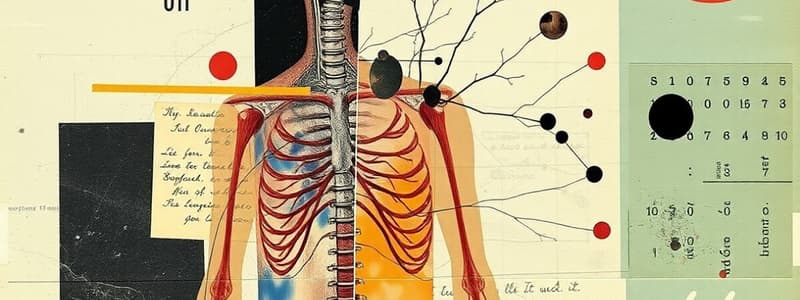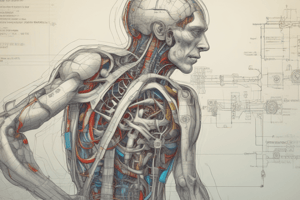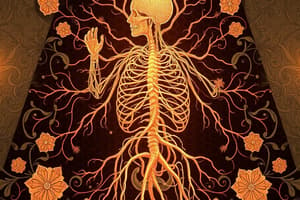Podcast
Questions and Answers
What is the primary neurotransmitter released by the sympathetic postganglionic neurons?
What is the primary neurotransmitter released by the sympathetic postganglionic neurons?
Where are the cell bodies of the preganglionic neurons of the sympathetic nervous system located?
Where are the cell bodies of the preganglionic neurons of the sympathetic nervous system located?
Which of the following is NOT a characteristic response of the sympathetic nervous system during a stressful situation?
Which of the following is NOT a characteristic response of the sympathetic nervous system during a stressful situation?
Which gland does the sympathetic nervous system stimulate to release epinephrine?
Which gland does the sympathetic nervous system stimulate to release epinephrine?
Signup and view all the answers
What is the effect of norepinephrine on the air passages of the lungs?
What is the effect of norepinephrine on the air passages of the lungs?
Signup and view all the answers
What is the effect of sympathetic nervous system activation on blood flow to skeletal muscles?
What is the effect of sympathetic nervous system activation on blood flow to skeletal muscles?
Signup and view all the answers
What is the primary function of the autonomic ganglia in the sympathetic nervous system?
What is the primary function of the autonomic ganglia in the sympathetic nervous system?
Signup and view all the answers
What is the overall effect of the sympathetic nervous system on the body in a stressful situation?
What is the overall effect of the sympathetic nervous system on the body in a stressful situation?
Signup and view all the answers
What is the chemical difference between adrenaline and noradrenaline?
What is the chemical difference between adrenaline and noradrenaline?
Signup and view all the answers
Which of these is a correct statement about the function of the parasympathetic nervous system?
Which of these is a correct statement about the function of the parasympathetic nervous system?
Signup and view all the answers
What is the main neurotransmitter released by the parasympathetic nervous system?
What is the main neurotransmitter released by the parasympathetic nervous system?
Signup and view all the answers
What is the correct anatomical layout of the preganglionic and postganglionic neurons in the parasympathetic nervous system?
What is the correct anatomical layout of the preganglionic and postganglionic neurons in the parasympathetic nervous system?
Signup and view all the answers
Where are the preganglionic cell bodies for the parasympathetic innervation of the head located?
Where are the preganglionic cell bodies for the parasympathetic innervation of the head located?
Signup and view all the answers
What is the clinical use of an 'EPIPEN®'?
What is the clinical use of an 'EPIPEN®'?
Signup and view all the answers
Which of the following is NOT a characteristic of the parasympathetic nervous system?
Which of the following is NOT a characteristic of the parasympathetic nervous system?
Signup and view all the answers
What is the effect of parasympathetic stimulation on the heart?
What is the effect of parasympathetic stimulation on the heart?
Signup and view all the answers
What is the name of the nerve that carries parasympathetic signals to the heart?
What is the name of the nerve that carries parasympathetic signals to the heart?
Signup and view all the answers
Which of the following accurately describes the role of the sympathetic nervous system in pupil dilation?
Which of the following accurately describes the role of the sympathetic nervous system in pupil dilation?
Signup and view all the answers
What is the term for the condition where pupils are constricted?
What is the term for the condition where pupils are constricted?
Signup and view all the answers
What is the drug historically used by women to dilate their pupils, and what plant is it extracted from?
What is the drug historically used by women to dilate their pupils, and what plant is it extracted from?
Signup and view all the answers
Where in the spinal cord do the preganglionic neurons for sympathetic innervation of the heart originate?
Where in the spinal cord do the preganglionic neurons for sympathetic innervation of the heart originate?
Signup and view all the answers
Which of the following is a major difference between the effects of adrenaline and noradrenaline on the body?
Which of the following is a major difference between the effects of adrenaline and noradrenaline on the body?
Signup and view all the answers
Which of the following is NOT a reason why the terms 'adrenaline' and 'epinephrine' are used interchangeably?
Which of the following is NOT a reason why the terms 'adrenaline' and 'epinephrine' are used interchangeably?
Signup and view all the answers
Where are the postganglionic cell bodies for the sympathetic innervation of the heart located?
Where are the postganglionic cell bodies for the sympathetic innervation of the heart located?
Signup and view all the answers
Study Notes
Motor Systems and Effector Organs
- Motor systems require an effector, which is either a muscle contraction or glandular secretion.
- Somatic motor system contracts skeletal muscles.
- Autonomic (visceral) motor system contracts smooth and cardiac muscles, and alters gland secretions.
- Both sympathetic and parasympathetic systems use two-neuron pathways (preganglionic and postganglionic neurons) with ganglion intermediary cell bodies.
Sympathetic Nervous System
- Often called the "fight-flight-freeze" system.
- Primarily widespread activation.
- Preganglionic cell bodies are located in the spinal cord (T1-L2).
- Preganglionic axons are short, synapsing in nearby sympathetic chain ganglia.
- Postganglionic neurons release norepinephrine (noradrenaline) onto effector organs, triggering responses like pupil dilation, dry mouth, increased heart rate, etc.
- Norepinephrine also stimulates the adrenal medulla, leading to epinephrine (adrenaline) release into the bloodstream.
- Norepinephrine and epinephrine bind to adrenergic receptors (same effect).
- Epinephrine/adrenaline used in clinical practice as a treatment for anaphylaxis (trade name EPIPEN®).
- Chemical differences between norepinephrine and epinephrine are minor (methyl group addition); naming differences in clinical usage historically confusing.
Parasympathetic Nervous System
- Often called the "rest and digest" system.
- Concentrated, organ-by-organ control.
- Preganglionic neurons have long axons that travel directly to the effector organs.
- Postganglionic cell bodies are located in intramural ganglia (within the organ walls).
- Preganglionic neurons release acetylcholine onto muscarinic acetylcholine receptors, leading to specific organ-level responses (like SLUDD—salivation, lacrimation, urination, digestion, defecation).
- Preganglionic cell bodies in the brainstem (cranial nerves for head and thorax/abdomen: vagus nerve) and sacral spinal cord regulate abdominal, retroperitoneal, and genital organs.
Heart Innervation
- Parasympathetic input slows the heart (vagus nerve via dorsal motor vagal nucleus).
- Sympathetic input speeds the heart (cell bodies in upper thoracic spinal cord; axons synapse in sympathetic chain ganglia, some without a direct cord link).
Pupil Response and Belladonna
- Sympathetic pathway dilates the pupil (mydriasis).
- Parasympathetic pathway constricts the pupil (miosis).
- Drugs like atropine (from belladonna) block muscarinic ACh receptors, leading to pupil dilation.
Studying That Suits You
Use AI to generate personalized quizzes and flashcards to suit your learning preferences.
Description
Explore the roles of motor systems and the sympathetic nervous system in regulating bodily functions. Learn how these systems involve different pathways and effector organs to coordinate responses to stimuli. This quiz will test your knowledge on muscle contractions, autonomic functions, and the impact of norepinephrine in the body.




